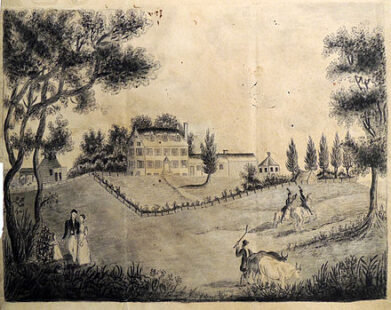George Morgan, (1743-1810), Charter member (1785), awarded the first Gold Medal by PSPA for “his essay on Farmyards” in 1786. He was a frontier merchant, friend of Native Americans (appointed as “Indian” Agent during Revolutionary War), appointed as a Colonel in the Continental Army, surveyor and town planner, and especially for our purposes, an avid agricultural experimenter.
Colonel Morgan purchased 210 acres adjacent to the nascent Princeton University (of which he was a graduate), and named it “Prospect Farm.” There, Morgan hosted 10 Native American chiefs for their unsuccessful parley with George Washington; he also hosted the Continental Congress in 1783.
Prospect Farm was a model farmstead, designed by Morgan to incorporate progressive farming methods, and was used as a laboratory for researching crop varieties, apiculture (he is said to have had 80 hives), and crop pest control, especially in finding solutions to the Hessian Fly infestation. His observance that Hessian Fly eggs are carried mainly on straw and litter, and not on the grain itself, led to his promotion of composting with manure and lime. A main component of his “anonymously submitted,” award-winning, farmyard design was space for saving manure. In 1796, Morgan inherited 600 acres in Washington County, Pennsylvania, where he continued his agricultural experiments.

